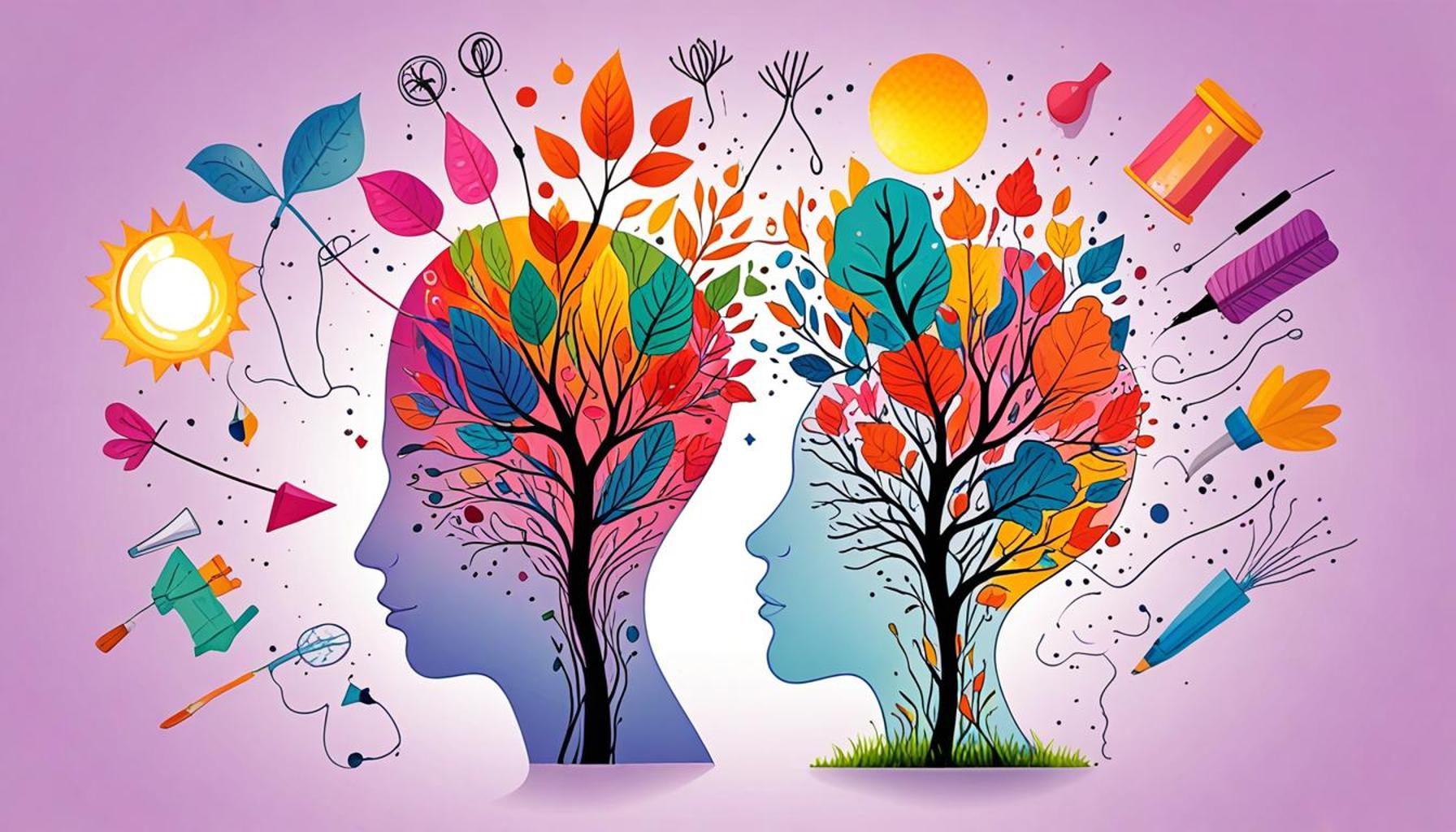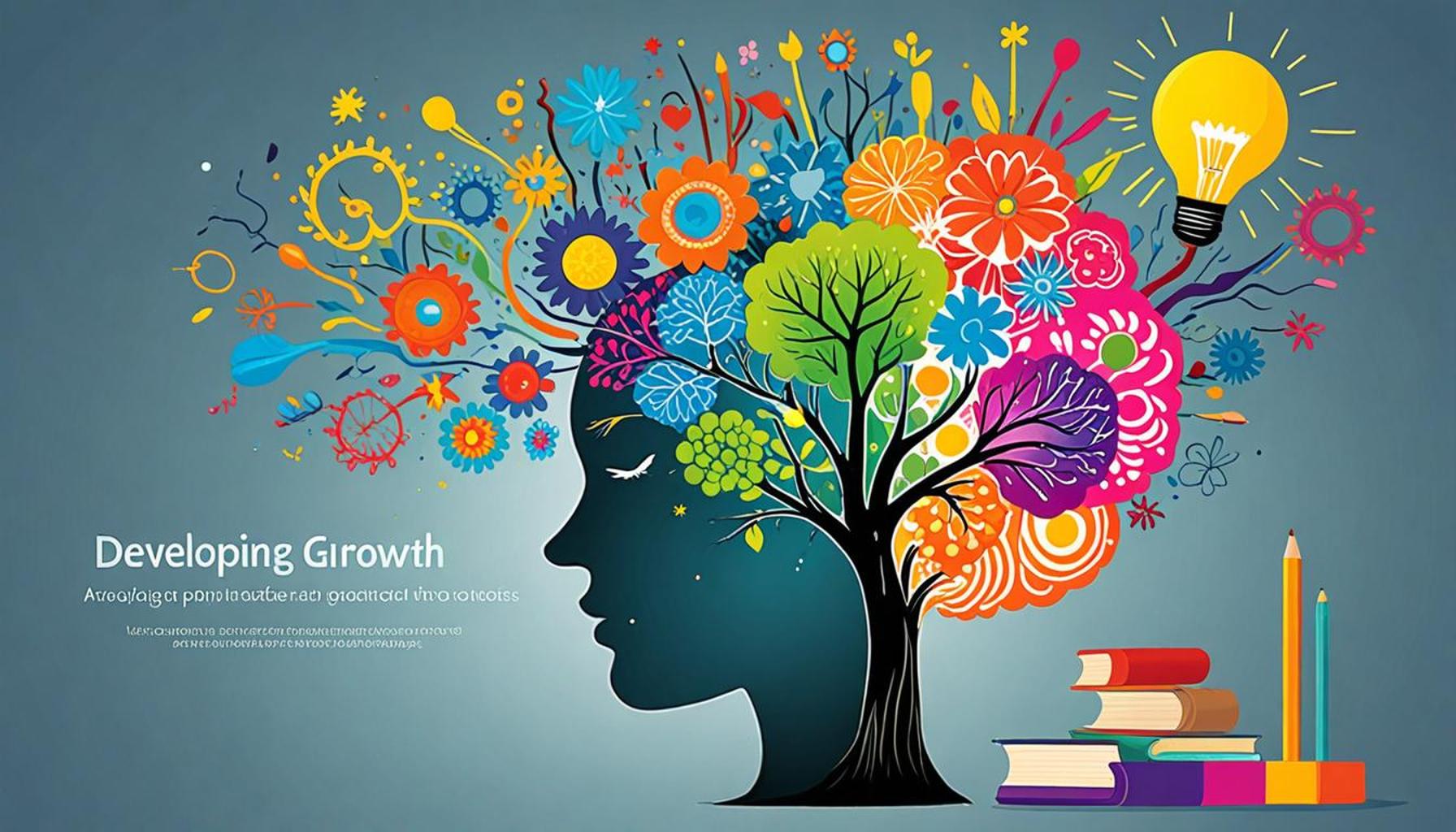How to Integrate Reflective Practice into Daily Life to Foster a Growth Mindset

Unlocking Growth Through Reflection
In today’s fast-paced world, individuals often overlook the power of reflective practice. This formal approach can significantly impact personal and professional growth, enabling us to learn from experiences and adjust our mindset. By integrating reflection into daily life, we cultivate a growth mindset that empowers us to embrace challenges and learn from failures.
Reflective practice involves being mindful of our thoughts and actions. It encourages a deeper understanding of our day-to-day experiences, fostering an environment where continuous learning is not just a concept but a way of life. Here are some key benefits:
- Enhanced self-awareness: Achieving a clear understanding of our strengths and weaknesses allows us to capitalize on our capabilities while addressing our limitations. For instance, a teacher in Nigeria reflecting on their classroom management skills can identify what strategies were effective and which need improvement, ultimately enhancing their teaching practice.
- Improved decision-making: Making informed choices based on past experiences is crucial. For example, a business owner might review the decisions made during a challenging quarter and reflect on what worked and what did not. This analysis helps refine future strategies, leading to better business outcomes.
- Resilience: Developing the ability to bounce back from setbacks fosters a sense of perseverance. In areas like entrepreneurship, where failure is common, reflecting on missteps can provide critical insights that support recovery and future success. Many Nigerian entrepreneurs, like Iyinoluwa Aboyeji—co-founder of Flutterwave and Andela—have spoken about how their experiences shaped their resilience and innovation.
In Nigeria, where opportunities for learning and growth are abundant, applying reflective practices can lead to remarkable transformations. Many successful entrepreneurs have attributed their achievements to the habit of reflecting on daily experiences. This culture of reflection not only applies to individuals but can be woven into group settings, such as family discussions or community meetings, where collective insights can pave the way for communal improvement.
Learning how to integrate reflective practice within your routine can open doors to personal development. Simple methods, such as maintaining a daily journal, engaging in regular self-assessments, or having constructive conversations with peers, can foster this habit. Setting aside time for reflection does not require extensive resources—just a quiet space and a willingness to explore one’s thoughts.
In this article, we will explore practical ways to incorporate reflection into everyday life and foster a sustainable growth mindset. Discover how small changes, whether in personal routines, workplace practices, or community dialogues, can lead to substantial growth and fulfillment. Embracing reflection can do more than promote individual success; it has the potential to create a ripple effect, fostering an environment where collective growth flourishes.

ADDITIONAL INSIGHTS: Expand your understanding here
Practical Strategies for Daily Reflection
Integrating reflective practice into daily life may seem daunting at first, but with some structured approaches, it can become a natural part of your routine. The key is to employ methods that resonate with your lifestyle and preferences, making reflection not just a task, but an enriching experience. Below are practical strategies to help you cultivate this habit:
- Establish a Daily Journal: Writing in a journal can serve as a powerful tool for reflection. Aim to set aside a few minutes each day to jot down your thoughts, feelings, and observations. This not only aids memory retention but also provides a structured way to analyze the day’s events. For instance, a software developer in Lagos might reflect on a project code written that day and note the challenges faced, promoting better problem-solving in future tasks.
- Engage in Thoughtful Self-Assessment: Allocate time each week for self-assessment, focusing on your progress toward personal and professional goals. Ask yourself questions like, “What went well this week?” or “What could I have done differently?” This practice encourages not only accountability but also transparency in the progress of one’s journey. In Nigeria’s competitive job market, such assessments can be key for both employees and job seekers to improve their skill sets effectively.
- Facilitate Reflective Conversations: Engaging in discussions with peers or mentors provides an avenue for collective reflection. Create a support group or join community forums where you can share experiences and insights. For example, in entrepreneurial circles in Nigeria, group reflections can uncover market trends or business challenges that one individual might not have recognized alone. This collaborative approach enriches personal growth and fosters a culture of learning from shared experiences.
- Practice Mindfulness: Incorporating moments of mindfulness into your daily routine can enhance reflective practice. Whether through meditation, yoga, or simply thirty seconds of deep breathing, being present allows for clearer thought processes. In calming environments, you can achieve a better understanding of your emotions and reactions to daily challenges, thus enlightening your growth mindset. In Nigerian urban spaces, where hustle and bustle are the norms, finding quiet moments can be transformative.
- Set Reflection Reminders: It can be easy to overlook reflection amidst busy schedules. Using digital tools such as calendar alerts or mobile apps dedicated to journaling can effectively remind you to pause and reflect. Make it part of your daily checklist, ensuring that reflection becomes an ingrained habit rather than an afterthought. Over time, these reminders transform reflection into an essential component of your daily rhythms.
Integrating these practices doesn’t require significant changes to your lifestyle; instead, it involves small shifts that can facilitate profound personal development. Whether it’s reflecting on a difficult conversation with a colleague or analyzing the success of a community initiative, every moment of contemplation reinforces a growth mindset, leading to ongoing evolution and resilience.
As you explore these methods, remember that the journey of reflection is inherently personal. The more intentional you become in your practice, the more insights you will gain, ultimately propelling you toward a mindset that embraces growth, adaptability, and lifelong learning.
How to Incorporate Reflective Practice into Everyday Routines
Integrating reflective practice into daily life requires a structured approach that promotes consistency and self-awareness. One effective strategy is to set aside dedicated time each day for reflection. This could be a few minutes in the morning or evening, allowing individuals to assess their thoughts, actions, and emotions throughout the day. Journaling is a powerful tool in this process. By noting experiences and feelings, individuals can recognize patterns, identify areas for improvement, and celebrate successes. Furthermore, combining journaling with prompts focused on growth can deepen the reflective process. Another proactive method is to engage in mindful meditation. This practice encourages individuals to pause, breathe, and evaluate their thoughts without judgment. By doing so, one can gain insight into automatic reactions and begin to cultivate a more thoughtful response to challenges. Moreover, sharing reflections with peers or colleagues can foster a sense of community and accountability. Group discussions or peer reviews can introduce new perspectives, enhancing the reflective experience and reinforcing a growth mindset.Lastly, integrating feedback into the reflective practice is crucial. Actively seeking feedback from others on performance or behaviors not only opens up opportunities for growth but also provides an external viewpoint that can highlight blind spots. This process creates a continuous feedback loop, ensuring that individuals are not just reflecting but are actively taking steps to implement changes for improvement.
Creating a Reflective Environment
Creating a conducive environment for reflection is essential. This can involve decluttering physical and mental spaces to reduce distractions. Setting up a dedicated reflection area—whether it’s a cozy corner at home or a quiet place at work—can signal to the mind that it’s time to engage in reflective practice. Moreover, using visual aids such as charts or progress boards can help track personal development over time, highlighting achievements and motivating continued effort toward a growth mindset. By prioritizing reflective practice in these everyday ways, individuals set the stage for ongoing learning and personal development. Emphasizing awareness and adaptability plays a vital role in fostering a resilient outlook, ultimately leading to enhanced performance, stronger relationships, and a more fulfilling life.
YOU MAY ALSO LIKE: Read read another article
Embracing Reflective Practice in Community Engagement
While individual reflection is essential, integrating reflective practices within your community can amplify the benefits, creating a ripple effect that fosters a collective growth mindset. How we connect and engage with those around us often shapes our perspectives and growth opportunities. Here are some insightful strategies for incorporating reflective practice into community-oriented endeavors:
- Organize Reflection Workshops: Consider hosting or participating in workshops aimed at exploring reflective practices within your community. Such gatherings can be invaluable, providing a structured space for individuals to share experiences and learn from one another. For instance, a local NGO in Nigeria might organize workshops that focus on community development projects, allowing participants to discuss challenges faced and collectively brainstorm innovative solutions. This not only enhances individual understanding but also fosters a sense of belonging and collaboration.
- Mentorship Programs: Establish or join mentorship programs that emphasize reflective practices. With experienced mentors guiding individuals through their journeys, mentees can explore their thoughts and experiences more deeply. For example, skilled professionals in Nigeria’s tech hub can mentor aspiring developers, encouraging them to reflect on past projects and learn from their setbacks. The reflective nature of such relationships often inspires both parties to adopt a growth mindset, propelling them toward success.
- Create a Community Reflection Board: Setting up a digital or physical community reflection board can stimulate collective reflection. Through this board, individuals can share their experiences, insights, or even challenges they face. Participants can post questions or topics for group discussion, facilitating a culture of openness and dialogue. This practice can thrive in neighborhoods or workplaces as it allows continuous learning through shared experiences. For instance, within a university setting in Nigeria, students might use a common platform to reflect on their academic journeys, helping each other through shared challenges.
- Engage in Service Learning: Integrating reflective practices into service learning initiatives provides meaningful insights while contributing to the community. Service learning programs encourage participants to reflect on their experiences and the impact of their engagement on both the community and their personal growth. In Nigeria, this could look like university students volunteering in local schools. They can reflect on their contributions and learn about the educational barriers in their environment, thus fostering empathy and a growth-based approach to problem-solving.
- Utilize Social Media for Reflection: In the digital age, platforms such as Twitter or Instagram can be leveraged to promote reflective practices within communities. Creating spaces for dialogue on these platforms increases accessibility and engagement. Encourage community members to post their reflections using dedicated hashtags, making it easy for others to join the conversation. This approach not only documents personal journeys but also enriches communal learning, creating a vast repository of insights relevant to the broader community context in Nigeria.
As these practices are embraced within a community context, the power of reflection expands, paving the way for collective growth. By sharing reflections, community members foster understanding, encourage innovation, and empower each other to embrace challenges with renewed vigor. This collaborative reflective practice can seamlessly weave into the fabric of everyday life, creating an environment where a growth mindset becomes not just an individual pursuit but a community ethic.
Ultimately, engaging in reflective practices within your community serves not only to enhance your individual mindset but also plants the seeds for shared success and empowerment among all members. This holistic approach to reflection helps cultivate an atmosphere where continuous improvement is celebrated and the potential for growth is recognized as a shared journey.
LEARN MORE: This related article may interest you
Conclusion: The Pathway to Continuous Growth and Learning
Incorporating reflective practice into daily life is not merely a personal endeavor; it serves as a vital catalyst for fostering a growth mindset within ourselves and our communities. As we have explored, the process of reflection encourages us to critically analyze our experiences, identify areas for improvement, and embrace challenges as opportunities for personal and collective development. By engaging in practices such as workshops, mentorship programs, community reflection boards, and service learning, we create an environment where learning is continuous, and every setback can lead to an avenue of insights and growth.
Moreover, the digital age offers unprecedented avenues for sharing reflections, enabling voices from diverse walks of life to contribute to the dialogue on growth and resilience. In Nigeria, youth and community members can leverage local social media platforms to foster connections, share experiences, and collectively navigate challenges, thereby reinforcing a culture where inquiry and reflection become ingrained in everyday interactions.
Ultimately, the journey toward integrating reflective practice into our lives is a shared one, significantly impacting our ability to adapt to change and cultivate a collective spirit of learning. As more individuals commit to reflection, we enhance not just our personal growth but also contribute to a resilient and innovative community ethos. Let us embrace this transformative path, recognizing that with each reflective thought, we plant the seeds of a growth mindset that blossoms into lasting success and empowerment for all.


